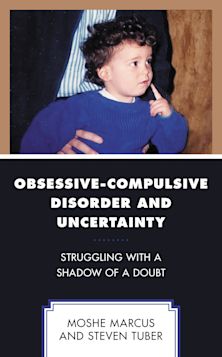- Home
- ACADEMIC
- Psychology
- Psychology - Other
- The Illusion of Control
The Illusion of Control
A Practical Guide to Avoid Futile Struggles
The Illusion of Control
A Practical Guide to Avoid Futile Struggles
You must sign in to add this item to your wishlist. Please sign in or create an account
Description
"Recommended for readers interested in gaining tools to improve their behavior and the tendency to want control of everything and everyone.” -Library Journal
Describes how people grossly overestimate the power they have over others while simultaneously missing opportunities to enjoy and use the power they have over themselves.
Based on scientific evidence (and lots of real-life experience), The Illusion of Control: A Practical Guide to Avoid Futile Struggles makes a well-justified case that people grossly overestimate how much power they have over others and simultaneously miss out on opportunities to enjoy and exploit the power they have over themselves. Readers learn how to reduce stress and improve quality of life by giving up ineffective habits and attempts at controlling the uncontrollable. The book intentionally begins by challenging readers to analyze where and when they are objectively not in control and how much failed control costs.
In a second block of chapters, broad strategies are suggested in order to bring about change, and multiple psychological theories are offered as tools for gaining control. Next, these tools are applied to changes within the individual to target sleep, drug use, weight control, and negative mood states. Finally, applications will demonstrate how to gain partial control (but still less than they wish) with respect to strangers, children, spouses, friends, workplaces, and broad political questions.
Product details
| Published | Jul 16 2024 |
|---|---|
| Format | Ebook (Epub & Mobi) |
| Edition | 1st |
| Extent | 248 |
| ISBN | 9781538183656 |
| Imprint | Rowman & Littlefield Publishers |
| Illustrations | 2 BW Photos, 1 Table |
| Publisher | Bloomsbury Publishing |
About the contributors
Reviews
-
Mental health care advocate Linden posits that many people believe they have more control over the other people in their lives than they actually do. Therefore, some become frustrated when they’re unable to influence or persuade others to do as they wish. His book indicates that people also tend to neglect or ignore the substantial amount of control they have over what they themselves do. He asserts that one way for people to become less stressed is to stop expecting to have control over others and to instead turn their energies toward controlling their own behavioral patterns. Linden offers readers several practical strategies that will help them rewire their thoughts to create new behavioral patterns. This book also addresses the benefits that come from changing one’s own behavior, using case studies involving married couples, parents and their children, friends, and colleagues to demonstrate how one’s actions can impact interpersonal communication. Recommended for readers interested in gaining tools to improve their behavior and the tendency to want control of everything and everyone.
Library Journal
-
Dr. Linden integrates psychological research and practice related to the fundamental question of ”just how much control do we really have over important aspects of our lives”? This book provides a thoughtful, well documented and honest review of this topic. Linden offers many successful strategies he has found useful over years of work but also uncovers realistic challenges and how to deal with them. Linden provides easy to understand and useful control strategies in many areas we experience daily. These include stress at home, relationships with kids and spouse, unhealthy habits, challenges with people at work and others we run into in our daily lives. This book provides insight and tips drawn from several decades of Dr. Linden’s research, practice and critical thinking on the topic of control.
Michael Feuerstein, PhD, MPH, Professor (ret) of Medical and Clinical Psychology and Preventative Medicine, founder and Editor in Chief, Journal of Cancer Survivorship: Research and Practice
-
Wolfgang Linden has woven experiences from his illustrious career as a researcher and teacher into a compelling and highly readable account of the challenges associated with control, specifically focusing on how little control we actually have over ourselves and others. This sounds like a depressing and hopeless tale--but it isn't. Linden carefully guides the reader through a series of chapters laden with practical advice that offers hope in our eternal quest to understand and respond to those things we can control and those things that we can't. This is an insightful book from a distinguished clinical psychologist and I recommend it highly.
Richard McCarty, Professor of Psychology Emeritus, Vanderbilt University, and author of Stress, Behavior and Health
-
Is being in control just a frustrating mirage? According to TheIllusion Of Control, the answer is far too often yes. Combining evidence-based science with a career’s worth of psychotherapist wisdom, however, the author shows us how we can still navigate our lives towards greater love and happiness even when control eludes us.
Thomas Rutledge, PhD, clinical psychologist and author of The Psychology of Eating

ONLINE RESOURCES
Bloomsbury Collections
This book is available on Bloomsbury Collections where your library has access.

































